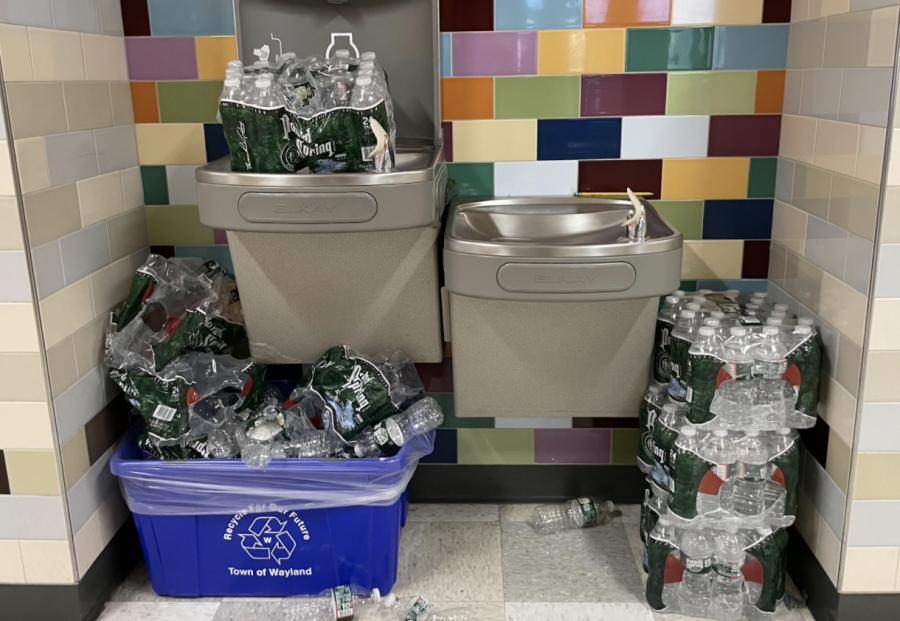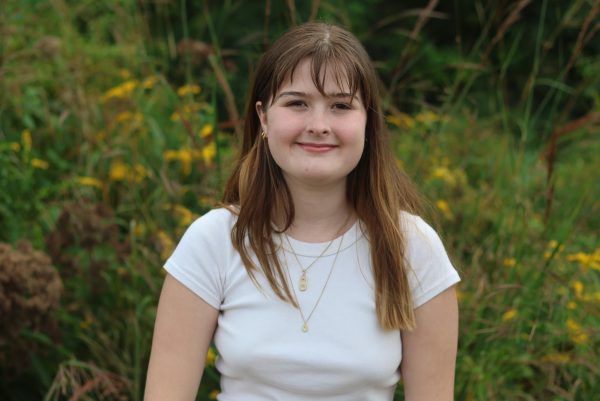The Wayland Water Issue: Problems and Solutions
Credit: Aimee Smith
Due to the abnormally high amount of PFAS in Wayland’s water, students are unable to use the normal water fountains at school. As a result, piles of the water bottles overflow from the recycling bins outside of Wayland High School’s fitness room, causing some students and staff to feel concerned about the amount of single-use plastic being used. “If we could all just be personally responsible for the number of single-use water bottles we’re using, I think that would help enormously,” Wayland High School Principal Allyson Mizoguchi said. “Every person matters in this situation, just like with every environmental issue.”
December 1, 2021
Since early last spring, Wayland has been struggling with abnormally high levels of PFAS (per- and polyfluoroalkyl substances) in the water, but coming mid-December, Wayland plans to implement construction that will allow residents to drink from the tap or water fountains once again.
According to Wayland Water Superintendent Don Millette, the town of Wayland plans to bring the levels back to the state standard of twenty parts per trillion per sample through the construction of a cement pad and resin filtration equipment at the Happy Hollow wells, where the main source of PFAS in the town’s water system is located.
The Board of Selectmen and Millette believe construction will go smoothly, and they think the only possible delays would be a holdup on construction equipment or the pipes freezing during the winter. However, once the equipment is in place and the town water samples show appropriate levels of PFAS for over three months, the Massachusetts Department of Environmental Protection (MassDEP) will declare the water drinkable.
“Once the equipment is up and running and the water is flowing through the filtration units, we’re going to begin sampling,” Millette said. “From what our engineers have told us, based on other projects that they’ve done, it’s almost immediate. So that first round of sampling should see a major reduction in the levels that we have.”
The MassDEP concluded that some sensitive subgroups include pregnant women, nursing mothers, infants less than one year and people with compromised immune issues after research beginning in March 2021. However, administrators and the School Committee want to ensure students’ safety by providing the schools with safe water. In the beginning, the town’s budget provided water to all of the schools, but the town has concluded through testing that only two out of the five schools have elevated levels of PFAS and are only providing bottled water to residents and schools at risk.
“We’ve been very careful in making clear to everybody the degree of risk for individuals and the lack of risk to individuals,” Chair of the Board of Selectmen Thomas Fay said. “Based on the testing of water that’s been done, the north end of town generally has lower PFAS chemicals in the water than in areas closest to the Happy Hollow well. The School Committee has every right to make its own policy on who it wants to give water to, and that’s their job, but our job as the Board of Selectmen is to the town overall.”
On the other hand, the School Committee disagrees and believes that the town should provide all five schools with bottled water until the water levels are safe for consumption, even if the schools have to pay for it themselves.
“The school district feels like all the schools should have bottled water, and the school department feels that, like in the past, the town should provide the bottled water,” Chair of the School Committee Chris Ryan said. “The town and the school department didn’t see eye to eye on that, so the school district has continued to pay for the bottled water for the other three schools.”
From the start of the water issue, Wayland schools have been providing their students with pallets of water bottles, but they do not believe that this will be sustainable. If the construction of the resin filtration system is delayed, school administrators and the School Committee will continue searching for more environmentally conscious solutions.
“We’ve thought about the possibility of instead of [providing] single use bottles, moving to some other system where folks can refill their water bottles using larger multi gallon sources,” WHS Principal Allyson Mizoguchi said.
Since the town plans to have construction done by the third or fourth week of December, school administrators are no longer discussing a more eco-conscious solution to the water bottles. However, on Tuesday, Nov. 23, the School Committee sent out an email reaffirming its desire to be more eco-conscious and budget friendly by encouraging students to bring water bottles from home and only use the bottled water provided as a last resort.
“After Thanksgiving, [the solution to the issue is] around the corner,” Ryan said. “If we can all work together for the environment and also for cost purposes to make those plastic water bottles our last resort, I think it would make a really big difference.”





![Last Wednesday, the Wayland School Committee gathered to discuss a number of topics regarding the health curriculum and Innovation Career Pathway course. Another large topic of conversation was the ways to potentially mitigate distracting cell phone usage. "These [phones] are going to distract your learning and social relationships," Superintendent David Fleishman said. "That's concrete right there."](https://waylandstudentpress.com/wp-content/uploads/2025/06/Screenshot-2025-06-04-at-9.49.31 PM-1200x886.png)



























![Troy Hoyt finishes the Boston Marathon, running for the Hoyt Foundation. T. Hoyt is the son of Hoyt Foundation CEO Russ Hoyt.
“[Running a marathon] might seem like a big thing, when it’s presented to you at first, but if you break it up and just keep telling yourself, “Yes, you can,” you can start chipping away at it. And before you know it, you’ll be running the whole 26 miles, and you won’t even think twice about it.” T. Hoyt said.](https://waylandstudentpress.com/wp-content/uploads/2025/04/C36E8761-1CBB-452E-9DF2-543EF7B1095E_1_105_c.jpeg)














































